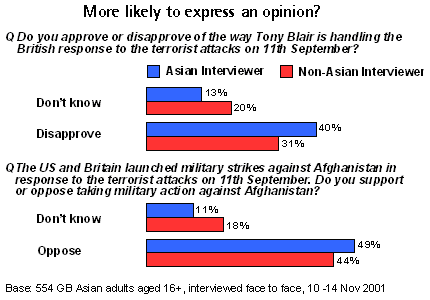Who's Asking? Answers May Depend On It
Last November we conducted a survey of British Asians on their attitudes to the military strikes in Afghanistan and to the War against Terrorism for Eastern Eye, a weekly newspaper aimed at Britain's Asian community. Over a third of the interviews were conducted by Asian interviewers. Therefore, in an interesting spin-off to the research we decided to look at whether or not the ethnicity of the interview made a difference on the answers given i.e. was there an interviewer effect? A number of studies in the United States and the in UK have been carried out looking into this phenomenon and several show that where the ethnicity of interviewer and respondent are matched, the responses yielded are different from those where they are not. These studies also suggest, however, that the interviewer effect only tends to be important when the subject of the survey is sensitive to the respondents' ethnicity or cultural background -- which is what we found.
In our survey we found Asian respondents more likely to give a 'don't know' answer if the interviewer is not Asian but also more likely to give an 'negative' answer if the interviewer is Asian. For instance, when asked whether they approved or disapproved of the way Tony Blair was handling the response to the terrorist attacks on 11th September, 13% said 'don't know' where the interviewer was Asian compared with 20% where the interview wasn't. People were more likely to say that they 'disapproved' to an Asian interviewer than a non-Asian interviewer; 40% compared with 31%. This suggests that Asians are more comfortable to give views that may go against the perceived national mood if the interviewer is of the same ethnicity. This pattern was observed on a number of different questions on the survey.
However, not all differences in responses conform to this pattern. Asked whether people thought that the majority of the British Muslim community have done too much, too little, or about the right amount in speaking out against the views of extreme Muslims, respondents were significantly more likely to say they have done the right amount to a non-Asian interviewer than an Asian interviewer; 27% compared with 17%. However, in contrast to earlier suppositions respondents were more likely to give a 'don't know' answer to an Asian interviewer than a non-Asian interviewer: 38% compared with 25%. There was significant different in the proportion giving the answer 'too little' : 37% to an Asian interviewer and 41% to a non-Asian interviewer.
Conclusions
While it is difficult to draw any hard and fast conclusions on the impact the ethnicity of the interviewer has on the response given from this small sample, it is clear that there are grounds to believe that matching interviewers and respondents by ethnicity may give more robust results to surveys involving sensitive and emotive issues which are linked to the ethnic or cultural background of the respondent. Some analysis shows that Asians are more likely to express an opinion or give an answer that is less in keeping with the perceived 'national mood' (e.g. more likely to disapprove of Tony Blair's response to events of 11th September). On the other hand, some findings of the poll challenge this supposition showing that the ethnicity of the interviewer has no effect. Therefore, it may be the focus of the question that has the greatest impact on the responses people are likely to give rather than the ethnicity of the interviewer. Of course, race may not be the only significant differentiator -- demographic characteristics such as the younger age profile and socio-economic status of Black and minority ethnic groups could also be at work -- which of course is impossible to test.

These findings have potentially important implications for research conducted among Black and minority ethnic groups -- more rigorous piloting may be required to ensure that it is the focus of the question that determines responses, rather than the ethnicity of the interviewer. Not only does this apply to research among Black and minority ethnic groups, but also to research that asks respondents of any group about sensitive or contentious topics which may be related to their membership of a particular group.
We will be looking at the interviewer effect on another recently conducted survey -- so watch this space!
Technical details
MORI interviewed 554 British Asian adults aged 16+. Interviews were conducted face-to-face, in street or in home between 10-14 November 2001. Interviews were conducted in 38 parliamentary constituencies with an Asian population of greater than 9%. 36% of the interviews conducted in this survey were carried out where the interviewer was Asian. (The ethnicity of the interviewer was recorded on each questionnaire.)



